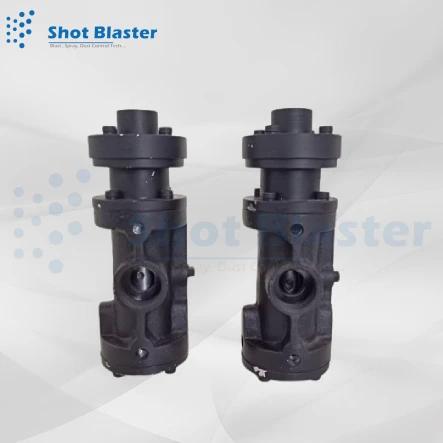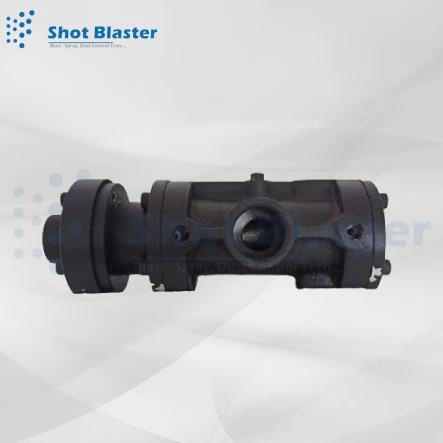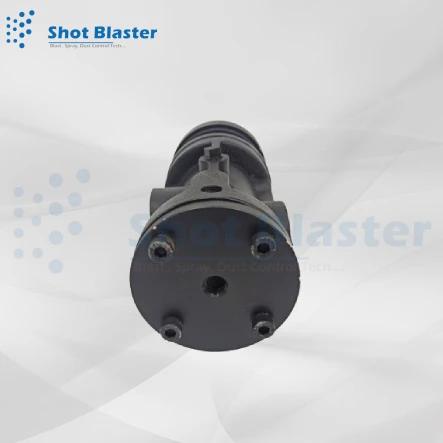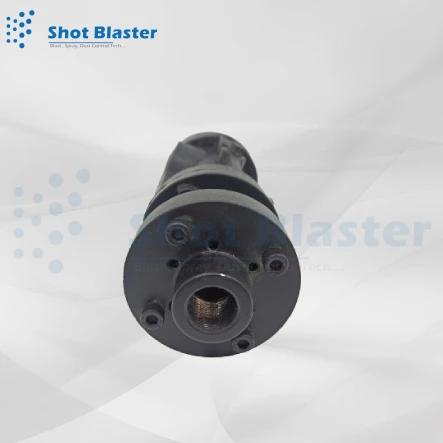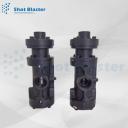Introduction of Remote Control Valve
Remote control valve in sandblasting operations, providing operators with precise control over the flow of air and abrasive media. Remote control valves are components utilized to control the flow, temperature, and pressure of a system. Remote control valves are paired with a controller that dictates said system's flow rate. This equipment improves both safety and efficiency by authorizing the operator to start or stop the blasting process from a distance, decreasing the necessity for manual operation of the machine itself. We also provide sand blasting machine spare part such as mixing tube, deadman handles, sand blasting hoses, sand blasting nozzles, etc.
A remote control valve for sandblasting is a pneumatic or electric equipment that regulates the flow of air and abrasive media. When used in conjunction with a deadman switch, it permits the operator to control the sand blasting machine functions, including pressurization also depressurization, from the nozzle end. This reduces the risk of injury, ensures precise control, & enhances the productivity of blasting operations. Deadman handle work by automatically stopping the discharge of abrasive and air if the operator loses control of the sand blasting hose, thereby improving safety.
Features of Remote Control Valves
- Safety and Efficiency: The primary function of a remote control valve is safety. By enabling operators to shut off the abrasive media stream immediately, these valves minimize accidents and protect workers. High-quality systems like the remote control valve allow immediate pressurization and depressurization, ensuring that work can be stopped safely and started again without significant delays. The built-in heavy-duty exhaust valve allows for rapid shutdown, making it a safe choice for large-scale sand blasting machine operations.
- Pressure Release Systems: These depressurize the machine when the deadman switch is released, making them ideal for periodic work stoppages. This is commonly used in scenarios where continuous blasting is necessary, and refilling the abrasive hopper frequently is not required.
- Pressure Hold Systems: These maintain pressure in the pot even after the deadman switch is released, conserving air and restarting the abrasive blasting machine much faster. Pressure hold systems are suitable for situations where frequent stops and starts are necessary.
- Ease of Maintenance: Systems like the remote control valve are designed with ease of maintenance in mind. These systems can be quickly disassembled using two union joints, allowing for minimal downtime during servicing. This ensures operators can maintain productivity while still addressing any potential mechanical issues.
How Remote Control Valve Work
In sand blasting, the remote control valve operates with the help of pneumatic or electric systems. The deadman control, which is usually a handheld lever, allows the operator to stop the flow of air and abrasive materials immediately. When the deadman handle is released, it simultaneously shuts off the air supply and the abrasive regulator, causing the system to depressurize (in a pressure-release system) or hold pressure for a quick restart (in a pressure-hold system).
Some advanced RCV systems, such as the auto air remote valve, are equipped with additional features like spring return diaphragm valves. These remote control valves are commonly utilized in conjunction with abrasive metering valves to further optimize the blasting process by reducing strain on the compressor and ensuring an almost instant blast when activated.
Types of Remote Control Valves
Remote Control Hydraulic Valves: These valves use pressurized fluids to actuate the valve mechanism. They are typically utilized in applications that mandate precise control, like in marine systems or oil rigs. Hydraulic control valves are favored for their durability and ability to function under high-pressure conditions.
Remote Control Pneumatic Valves: These are the most typical types of RCVs utilized in portable sand blasting machine. They rely on compressed air to handle the flow of materials. Pneumatic systems are typically preferred for their simplicity also reliability in industrial settings.
Electric Remote Control Valves: Electric systems are also available and offer more exact control compared to their pneumatic counterparts. However, they may require additional safety features to prevent electrical hazards in environments where moisture or conductive materials are present.
Mechanical Remote Control Valves: These use flexible shafts or rigid rod systems to manually operate valves from a distance. This type is used in situations where safety or logistics make it impractical to manually adjust the valve directly. Industries like shipbuilding and oil refineries benefit from such systems due to their reliability and minimal need for maintenance.
Auto Air Remote Valves: The auto air remote valve is an example of a high-performance remote control valve designed for sand blasting operations. It is known for its versatility, being suitable for both pressure-hold and pressure-release systems. This type of valve is ideal for heavy-duty sandblasting operations, particularly when multiple operators are working simultaneously.
Remote Control Valve Supplier
We are the leading remote control valve manufacturer and also the remote control valve supplier in India. Our remote control valve price is low compared to others. We also offer abrasive blasting machines, automatic sand blasting machine, grit blasting machines, sand blasting spare parts, sand blasting helmets, sand blasting hoses, sand blasting nozzles, pinch valves, sand blasting stencils, mixing tubes, wet blasting nozzles, tungsten carbide nozzle, and more.


